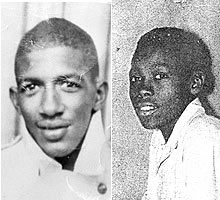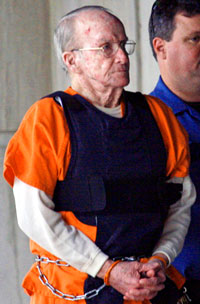-Staff Writer-

BATON ROUGE, La. (FinalCall.com) – ”I’m sick and tired of the games and lies told in the newspaper. We have a $20,000 reward and no one wants to come forward and do anything. There’s a whole lot of investigating going on but nothing’s happening. I’ve been screwed around for the past 45 years. The FBI is my only hope,” said Henry Allen, the son of murdered civil rights worker Louis Allen to The Final Call.
“I’m sick and tired of living like this. I’ve been to Washington, D.C. for justice and I’ve been to Jackson, Ms. I hope this new FBI crew does better. The old crew was a bunch of crooks, nothing but J. Edgar Hoover’s offspring.”
Who Killed Louis Allen?
The year is 1964 in Liberty, Mississippi. Bread costs 21 cents, gas is 30 cents a gallon, the war widens in Vietnam and violence against Blacks continues. The year begins with the death of Louis Allen.
His murder had been brewing since 1961 when he witnessed the killing of local NAACP President Herbert Lee for registering Black voters by state legislator E. H. Hurst. Under threats, Mr. Allen was forced to testify that Mr. Hurst killed Mr. Lee in self-defense.
“My grandfather contacted the Justice Department and the FBI for help but the FBI agent assigned to the case leaked it back to the local officials, the sheriff and the judge, who were members of the Klan,” Louis Allen Ali, grandson and namesake of Louis Allen, told The Final Call.

That led to years of threats, jailings and harassment. Pleas to the FBI for assistance were refused. Mr. Allen was making final arrangements to move to Milwaukee the day he was killed by shotgun blasts.
His case remains open with the FBI.
FBI Cold Case Initiative
“I’ve got one picture of a cold case on my desk and that’s Louis Allen and I have one video and that’s of Johnnie Mae Chappell,” explained Cynthia Deitle, FBI Civil Rights Unit Chief, head of the FBI’s Cold Case Initiative to a standing room only crowd at Southern University, November 18.
Since the investigative phase of the Civil Rights-Era Cold Case Initiative was launched in February 2007, a total of 108 unsolved or inadequately solved racially-motivated homicides have been forwarded to 17 field offices for a fresh assessment of legal and investigative viability.
“We investigate racially charged homicides before 1969,” Ms. Deitle said, “Some of these cases the FBI never looked at. Some of the cases the FBI did volumes of work on, some cases got little attention and some we worked on with the local law enforcement.”
The FBI wants to notify the victims’ families of the results of the investigations. Unfortunately, due to the passage of time and the migration of many families, the FBI has been unable to identify the victims’ next of kin in 33 cases.
In the case of Johnnie Mae Chappell, the FBI knows who killed her. They were indicted by a grand jury but never prosecuted. Mrs. Chappell’s story is the focus of Keith Beauchamp’s History Channel movie Wanted Justice: Johnnie Mae Chappell.
“In 2004 I convinced the FBI to reopen the Emmit Till case with the power of my film. As a filmmaker we’re able to get access to more information than the FBI. We have an opportunity to make a difference and make a change. After a few more years’ perpetrators are dying, witnesses are dying. We need your help,” he told The Final Call.
Mrs. Chappell’s 10th child, Shelton, was only four months old when his mother was gunned down as she walked down a highway. “We’ve been on Oprah and Dateline. Why can’t we get justice? The 1964 Jet Magazine photo of my mother is all I have of her. I’m asking the federal officials to help me.”
Mrs. Chappell’s case is still open.
Mr. Beauchamp is traveling with the FBI asking people with any information they may have on cold cases to speak up.
“Some of you have heard stories. I’m looking for the elders who know the stories. These issues need to be addressed. Don’t be afraid to stand up and talk. For so many years the FBI has been untouchable; they have to become touchable. There’s a new face to the FBI and they want to close these cases.”
To date, there have been two successful federal prosecutions involving civil rights-era murder cases. Ernest Avery Avants was sentenced to life in prison for the murder of Benjamin Charles White. James Ford Seale was sentenced to three life terms for the murders of Charles Moore and Henry Dee.
Mr. Ali is frustrated. “We haven’t seen any progress. We hear them talking. They’re generating a lot of publicity for cold cases but the FBI is ineffective when they are blocked from doing anything and all they can do is turn it over to the local level and are blocked by the people who want to protect their ancestors.”
The FBI can investigate but is only allowed to intervene when there are explosives involved, kidnapping or a murder took place on federal property.












